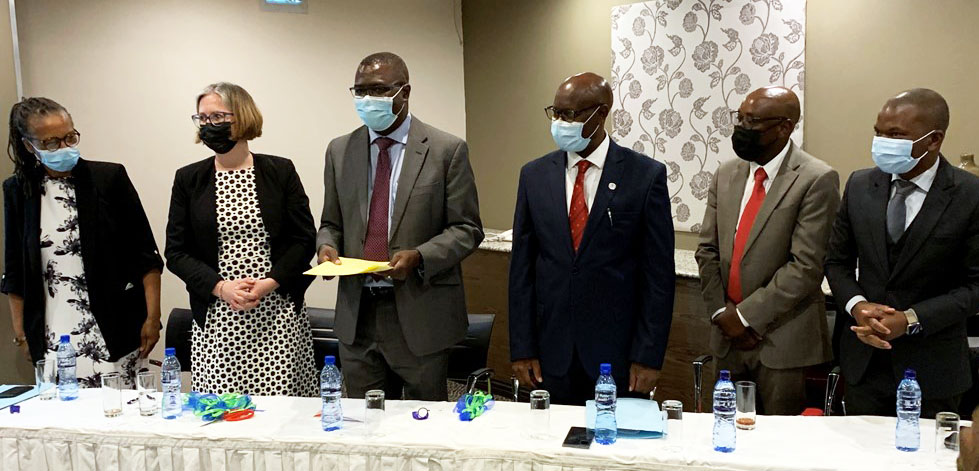The launch event, held on 29th March 2022 in Lusaka, marked the beginning of several collaborative activities to tackle specific antimicrobial resistance (AMR) challenges in the Zambian context. Attended by representatives from Ministry of Health, Ministry of Fisheries and Livestock, Zambia National Public Health Institute (ZNPHI), national research institutions and ICARS, the launch demonstrated a strong commitment to tackling AMR in the country.
In addition, the government of Zambia have committed to become an ICARS Mission Partner, which demonstrates both an expression of support to ICARS’ mission and vision, as well as a commitment to actively working to promote the AMR agenda in their national context.

At the event, Professor Roma Chilengi, Deputy General of ZNHPI provided an overview of the ongoing AMR challenges in Zambia and existing initiatives to tackle them. The Permanent Secretary of the Ministry of Health, Dr. Prof. Lackson Kasonka, on behalf of Minister of Health, Sylvia Masebo, provided a keynote address focusing on Zambia’s efforts to implement their National Action Plan on AMR, stressing the value of collaborative multisectoral partnership. In another speech, Permanent Secretary of the Ministry of Fisheries & Livestock, Dr. Anna Songolo, reflected on the importance of the implementation phase of the projects and expressed the firm commitment and support of the ministry to make this a success.
From the ICARS delegation, Dr. Mirfin Mpundu, Africa lead, presented an overview of the projects and their objectives. Helle Krarup, Director of Operations, spoke about the importance of partnership in building sustainable solutions to tackle AMR and thanked the Zambian teams for their effort and commitment to lead the upcoming projects.
Following co-development of the project proposals over the past six months, ICARS and Zambia now plan to begin implementation of antimicrobial stewardship activities in both the human and veterinary sector. The stewardship activities will support Zambia’s Multi-Sectoral National Action Plan on Antimicrobial Resistance for 2017-2027 and will prepare the foundation for further collaboration in the coming years.
Project overviews
Combating antimicrobial resistance and antimicrobial residues in the Zambian poultry sector
Poultry products in Zambia form an integral part of the human diet in many households, as they are cheap and easy to produce. The burden of poultry diseases has however remained a major challenge. Growing consumer demand for poultry products in Zambia has resulted in non-prudent antimicrobial use on farms, with the intent to prevent and treat poultry diseases for growth optimization and maximising profits.
By developing and implementing poultry treatment guidelines, complementary targeted education and training, as well as supporting incentives for behaviour change, this project aims to optimize prescribing and use practices among veterinary personnel, farmers and Agrovet shops. The aim of the project is to reduce antimicrobial use and residues in broilers and eggs by 30% in selected districts of Zambia.
Optimisation of antimicrobial use for bloodstream infections (BSI) and urinary tracts infections (UTI)
In clinical practice UTIs and BSIs are associated with extensive inappropriate use of antibiotics. According to a situational analysis, overuse and misuse of antibiotics is driven by either lack of guidelines or adherence to guidelines.
This project will introduce an antimicrobial stewardship programme (AMS), tools and training, adapted from core components of WHO’s practical toolkit. By translating these best-practice materials to fit the context the project aims to reduce unnecessary use of antibiotics for BSIs and UTIs in hospitals and at community clinics by 20% over three years, while also reducing healthcare costs.
Supporting project co-funded by Wellcome Trust to test and implement the Responsive Dialogue toolkit
To compliment the project led by the Zambian Ministry of Health to tackle antibiotic misuse in healthcare settings, the Wellcome Trust in partnership with ICARS, are supporting Eden University to test and implement a Responsive Dialogue toolkit to tackle AMR in three community settings in Zambia. Through community conversations, the project will gather evidence on antibiotic-seeking behaviour, identify drivers of antibiotic use in relation to UTIs, and develop community-informed and contextually relevant solutions that address AMR and antibiotic use. Findings from the project will support other activities in the region and inform how the Zambian AMR NAP and associated policies are implemented.
To stay up to date on ICARS project activities visit our projects webpage and subscribe to receive the ICARS quarterly newsletter.

